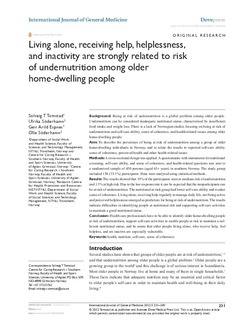| dc.contributor.author | Tomstad, Solveig Thorbjørnsen | |
| dc.contributor.author | Söderhamn, Ulrika | |
| dc.contributor.author | Espnes, Geir Arild | |
| dc.contributor.author | Söderhamn, Olle | |
| dc.date.accessioned | 2019-10-14T07:48:16Z | |
| dc.date.available | 2019-10-14T07:48:16Z | |
| dc.date.created | 2012-03-06T17:47:11Z | |
| dc.date.issued | 2012 | |
| dc.identifier.citation | International Journal of General Medicine. 2012, 5 231-240. | nb_NO |
| dc.identifier.issn | 1178-7074 | |
| dc.identifier.uri | http://hdl.handle.net/11250/2621845 | |
| dc.description.abstract | Background: Being at risk of undernutrition is a global problem among older people. Undernutrition can be considered inadequate nutritional status, characterized by insufficient food intake and weight loss. There is a lack of Norwegian studies focusing on being at risk of undernutrition and self-care ability, sense of coherence, and health-related issues among older home-dwelling people. Aim: To describe the prevalence of being at risk of undernutrition among a group of older home-dwelling individuals in Norway, and to relate the results to reported self-care ability, sense of coherence, perceived health and other health-related issues. Methods: A cross-sectional design was applied. A questionnaire with instruments for nutritional screening, self-care ability, and sense of coherence, and health-related questions was sent to a randomized sample of 450 persons (aged 65+ years) in southern Norway. The study group included 158 (35.1%) participants. Data were analysed using statistical methods. Results: The results showed that 19% of the participants were at medium risk of undernutrition and 1.3% at high risk. Due to the low response rate it can be expected that the nonparticipants can be at risk of undernutrition. The nutritional at-risk group had lower self-care ability and weaker sense of coherence. Living alone, receiving help regularly to manage daily life, not being active and perceived helplessness emerged as predictors for being at risk of undernutrition. The results indicate difficulties in identifying people at nutritional risk and supporting self-care activities to maintain a good nutritional status. Conclusion: Health care professionals have to be able to identify older home-dwelling people at risk of undernutrition, support self-care activities to enable people at risk to maintain a sufficient nutritional status, and be aware that older people living alone, who receive help, feel helpless, and are inactive are especially vulnerable. Keywords: health, nutrition, self-care, sense of coherence | nb_NO |
| dc.language.iso | eng | nb_NO |
| dc.publisher | Dove Medical Press | nb_NO |
| dc.relation.uri | http://www.dovepress.com/living-alone-receiving-help-helplessness-and-inactivity-are-strongly-r-peer-reviewed-article-IJGM | |
| dc.rights | Navngivelse-Ikkekommersiell 4.0 Internasjonal | * |
| dc.rights.uri | http://creativecommons.org/licenses/by-nc/4.0/deed.no | * |
| dc.title | Living alone, receiving help, helplessness, and inactivity are strongly related to risk of undernutrition among older home-dwelling people | nb_NO |
| dc.type | Journal article | nb_NO |
| dc.type | Peer reviewed | nb_NO |
| dc.description.version | publishedVersion | nb_NO |
| dc.source.pagenumber | 231-240 | nb_NO |
| dc.source.volume | 5 | nb_NO |
| dc.source.journal | International Journal of General Medicine | nb_NO |
| dc.identifier.doi | 10.2147/IJGM.S28507 | |
| dc.identifier.cristin | 913797 | |
| dc.description.localcode | © 2012 Tomstad et al, publisher and licensee Dove Medical Press Ltd. This is an Open Access article which permits unrestricted noncommercial use, provided the original work is properly cited. | nb_NO |
| cristin.unitcode | 194,65,20,0 | |
| cristin.unitname | Institutt for samfunnsmedisin og sykepleie | |
| cristin.ispublished | true | |
| cristin.fulltext | original | |
| cristin.qualitycode | 1 | |

